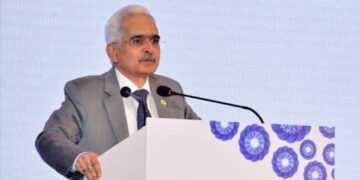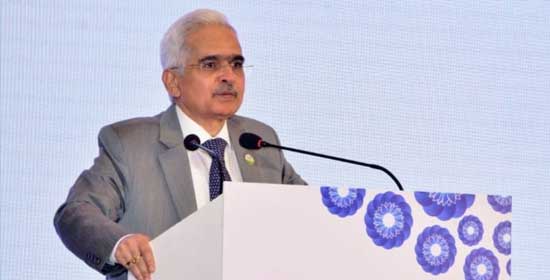 RBI Governor Shaktikanta Das on Friday said that India’s G20 Presidency aims at enhancing global cooperation to face multifarious and intertwined challenges in ensuring post-pandemic recovery in the face of elevated inflation, financial market vulnerabilities, reduced policy headroom and geo-political tensions. In his address at the seminar on ‘’Global Economy: Challenges, Opportunities, and the Way Forward, held as part of the International Financial Architecture (IFA) and Framework Working Groups (FWG) workstreams under India’s G20 Presidency, Das said that ‘’One Earth-One Family-One Future theme underlines the importance of global public goods for common prosperity of all.
RBI Governor Shaktikanta Das on Friday said that India’s G20 Presidency aims at enhancing global cooperation to face multifarious and intertwined challenges in ensuring post-pandemic recovery in the face of elevated inflation, financial market vulnerabilities, reduced policy headroom and geo-political tensions. In his address at the seminar on ‘’Global Economy: Challenges, Opportunities, and the Way Forward, held as part of the International Financial Architecture (IFA) and Framework Working Groups (FWG) workstreams under India’s G20 Presidency, Das said that ‘’One Earth-One Family-One Future theme underlines the importance of global public goods for common prosperity of all.
“Global Public Goods (GPGs) play a crucial role in shaping developmental strategies and securing human welfare across borders and generations. Financing them has become a critical issue in the wake of the COVID-19 pandemic, the highly unsettled geopolitical environment, climate change, fractures in international supply chains, and tectonic shifts in financial market conditions and global liquidity. Given the confluence of such factors, global financial stability is gaining prominence in the hierarchy of global public goods,’’ said Das.
India’s experience has shown how Digital Public Infrastructure (DPI) can be utilised for advancing financial inclusion and productivity gains through cost reductions. ‘’Our sustained engagement in the India Stack and the Unified Payments Interface (UPI), especially during the pandemic and thereafter, has filled us with the conviction that digital public infrastructure like the UPI can become a critical part of global public goods when scaled up beyond national borders,’’ he noted.
Das said while the G20-led initiatives such as the Common Framework (CF) for debt treatment and the Debt Service Suspension Initiative (DSSI) have been discussed intensely, significant progress beyond these have to be achieved. I would like to make three specific suggestions in this context. He suggested that it is essential that Debt Sustainability Analysis (DSA) for countries is realistic on growth and fiscal projections are fully founded on accurate and comprehensive debt data. A global debt data-sharing platform can help in this regard. Establishing such a platform could be very challenging and may take several years. ‘’In the interregnum, therefore, we may examine the possibility of constructing suitable proxies for debt flows. Such proxies may be derived from data on capital flows and local banking statistics from sources such as the Institute of International Finance (IIF) and the Bank for International Settlements (BIS),’’ he added.
According to Das, the crucial role of the International Monetary Fund (IMF) and the World Bank in addressing global debt vulnerabilities cannot be overstated. These institutions are at the centre of the international monetary and financial system. Hence it is incumbent upon them to do more for countries in debt distress. At present, the IMF’s precautionary programmes such as the Precautionary Lending Line are available for countries with sound macro-fundamentals; however, there is little reason for countries with strong macro-fundamentals to seek Precautionary Lines.
Further, Stand-By Arrangements (SBAs) are offered for countries with a balance of payments crisis; but SBAs come with performance benchmarks, and the attendant stigma. This is an important issue, as the recent experience shows how the perceived stigma of and/or lack of access to IMF programmes can cause countries to seek support from other lenders rather than the IMF, with debt sustainability consequences. It may be helpful if programs can be designed with less conditionality for countries with macro-fundamentals that are not sound but reasonably resilient, if they are not marred by balance of payments stress.
The RBI Governor argued that the corrective measures, including financing, should be put in place in a timely, non-stigmatised and more open access basis. ‘’For this purpose, a bigger and stronger IMF that is capable of managing the levels of country risk assumes crucial importance. Since the IMF’s support is linked to the quota size of countries, the 16th general review of quotas and its attendant requirements, including governance reform, need to be completed expeditiously. Besides enhancing the legitimacy of the IMF in its oversight of the international monetary and financial system, this will increase traction for the IMF’s policy advice. We must not allow the burden of debt to stifle the potential for global growth,’’ he said.
















